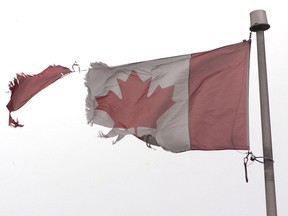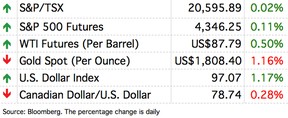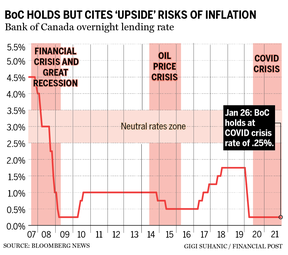Descent down the ranking is among the fastest in the world

Reviews and recommendations are unbiased and products are independently selected. Postmedia may earn an affiliate commission from purchases made through links on this page.
Article content

Canada’s reputation as an international boy scout keeps slipping.
Advertisement
Article content
The country’s rank on Transparency International’s corruption perceptions index (CPI) has fallen “significantly” over the past five years, the Berlin-based non-governmental organization observed in its 2021 report, which was released earlier this week.
Canada scored 74, good enough for a five-way tie for 13th of 180 countries with Austria, Estonia, Ireland, and Iceland. That’s still decent company. But it’s Canada’s fall from the top tier that caught Transparency International’s attention. Canada scored 77 in 2020, which was already a significant drop from 82 in 2017.
Overall, Canada’s descent down the ranking is among the fastest over that five-year period. While Armenia jumped 14 spots, and South Korea climbed eight rungs, Canada dropped eight positions over that period. That put Canada with the “significant decliners,” a group that includes Australia and the United States, and also countries such as Nicaragua, Honduras, and Venezuela.
Advertisement
Article content
Transparency International’s corruption index measures “perceived levels of public sector corruption according to experts and business people.” The group draws from 13 sources, including various corruption surveys and assessments, collected by institutions such as the World Bank and the World Economic Forum to compile a score out of 100 for each country. Eight of the 13 sources were used to assign Canada its score, according to the Canadian arm of Transparency International.
A score of 100 indicates a country is essentially free of corruption; a score of zero indicates a country is very corrupt.
Transparency International noted the scandal that engulfed Prime Minister Justin Trudeau and former finance minister Bill Morneau over their connections to the WE charity.
Advertisement
Article content
Among other corruption issues in Canada: estimates that $45 billion to $113 billion in illicit funds are laundered annually through Canada; the country’s last-place score in a ranking of whistle-blower protections compiled by the Government Accountability Project and the International Bar Association; and the failure of Canadian authorities to lay any criminal charges in the wake of the Panama Papers, documents that detailed a global network of tax havens that were leaked in 2016.
Issues involving the laundering of private funds weren’t included in calculating Canada’s score. However, “weak” regulatory laws governing money laundering did play a role in Canada’s declining CPI score, said Transparency International Canada.
Advertisement
Article content
Transparency International’s corruption index was established in 1995. A decade ago, Canada posted a score of 84 out of 100, ranking ninth out of 176 on the index. Although Canada still sits relatively high, the report’s authors noted that corruption that goes unchecked in one part of the world has a knock-on effect elsewhere.
“Our analysis shows that such corruption schemes – often facilitated by advanced economies who score well on the CPI — exacerbate repression by allowing autocrats to … enjoy looted funds, launder their reputation, evade accountability,” the report said.
In 2021, the top countries on the index were Denmark, Finland, and New Zealand, scoring 88. Norway, Singapore and Sweden scored 85.
Advertisement
Article content
The countries sitting at the bottom of the index were Afghanistan, North Korea, Yemen, 16 out of 100; Venezuela, 14 out of 100; Somalia and Syria, 13 out of 100 and South Sudan at 11 out of 100.
Twenty-five countries improved their scores between 2012 to 2021, while the scores of 23 — including Canada — declined. The scores of 131 countries were unchanged during that period.
“Overall, the CPI shows that control of corruption has stagnated or worsened in 86 per cent of countries over the last decade,” the report said.
_____________________________________________________________
Was this newsletter forwarded to you? Sign up here to get it delivered to your inbox.
_____________________________________________________________
Advertisement
Article content

___________________________________________________

___________
- Prime Minister Justin Trudeau delivers opening remarks at the virtual National Caucus Winter Retreat
- Teck Resources Ltd. president and CEO Don Lindsay will participate in a fireside chat at the TD Securities Mining Conference
- Canada’s procurement ombudsman will host the Diversifying the Federal Supply Chain Virtual Summit
- Steven Guilbeault, minister of environment and climate change, will hold a virtual press conference in Gatineau, Quebec to announce funding to fight climate change through the Low Carbon Economy Fund
- Today’s Data: Canadian job vacancies; U.S. GDP (Q4), initial jobless claims, durable goods orders
- Earnings: Rogers Communications, Canadian Pacific Railway, Apple, McDonald’s, Visa, MasterCard, Robinhood Markets
Advertisement
Article content
________________________________________


_______________________________________________________

Advertisement
Article content
___________________________________________________

The Bank of Canada held rates at COVID-19 crisis level of 0.25 per cent at its Jan. 26 meeting but governor Tiff Macklem signalled that hikes are likely coming, possibly as early as March, as the central bank embarks on its mission to tackle inflation.
“Looking ahead, the Governing Council expects interest rates will need to increase, with the timing and pace of those increases guided by the bank’s commitment to achieving the (two per cent) inflation target.”
Essentially, the BoC has declared “mission accomplished” where shielding the economy from the effects of the pandemic are concerned. As proof the central bankers cited a closed output gap and employment restored to levels expected prior to March 2020.
Advertisement
Article content
On a broader economic note, the BoC revised its Q4 GDP estimate to 5.8 per cent supplying “enough momentum to push through headwinds caused by the Omicron variant of COVID-19 and still produce growth of about two per cent in the current quarter,” wrote Kevin Carmichael .

____________________________________

Colleges and universities around the world offer courses and entire degrees in business, business management and other parallel fields. And yet, education specifically geared towards entrepreneurism and founding companies is a lot less common.
When you think about how fast the concept of starting a business has morphed during the digital age, it’s kind of surprising that it’s not a more intense field of study. Starting businesses today is a fascinating topic that relates to making money, and it changes daily.
Advertisement
Article content
Our content partner StackCommerce offers a solution with The Founders’ Book , with includes tools and resources specifically curated for first-time founders, entrepreneurs, and those running early-stage startups. It features over 2,000 articles and guides, tools and platforms, and startup deals and credits that can save you thousands on software subscriptions.
____________________________________________________
Today’s Posthaste was written by Gigi Suhanic (@GSuhanic), with additional reporting from The Canadian Press, Thomson Reuters and Bloomberg.
Have a story idea, pitch, embargoed report, or a suggestion for this newsletter? Email us at posthaste@postmedia.com , or hit reply to send us a note.
Listen to Down to Business for in-depth discussions and insights into the latest in Canadian business, available wherever you get your podcasts. Check out the latest episode below:
Advertisement
Posthaste: Canada's rank on corruption index has fallen 'significantly' over past five years - Financial Post
Read More
No comments:
Post a Comment